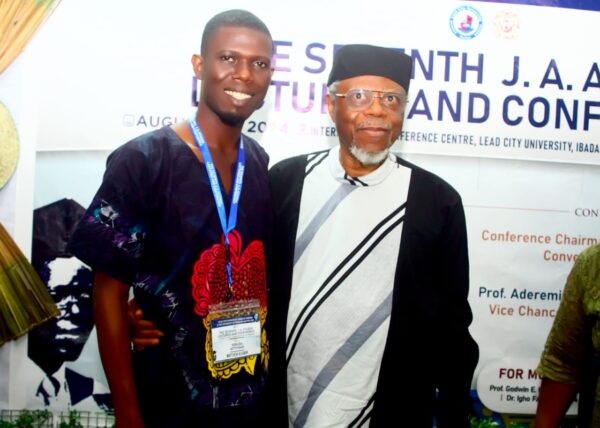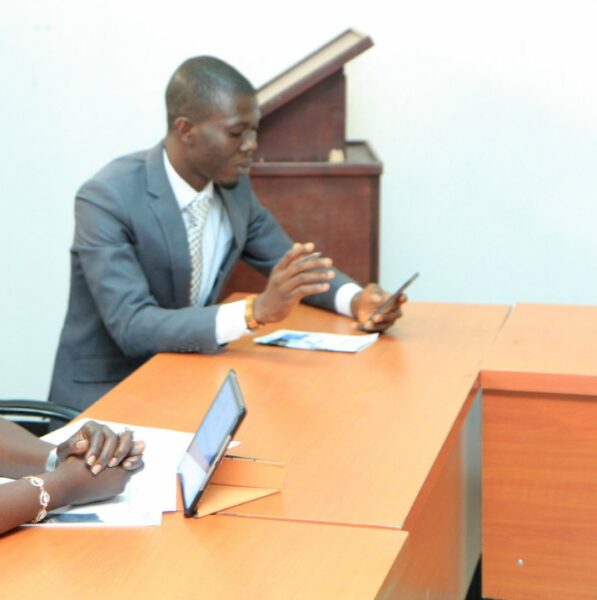By Matthew Alugbin
In celebration of J. A. Atanda, Prof. Toyin Falola and other scholars from across Nigeria gathered at Lead City University, Ibadan, from August 5-7, 2024, for the Seventh J. A. Atanda Lectures and Conference, themed “Yoruba Activisms.” Close to 300 scholars from various disciplines gathered at the two-day conference to deliberate on issues related to Yoruba activisms. Coincidentally, the conference took place during a period of national dissent in Nigeria. Growing economic hardship, inflation in food prices, the removal of fuel subsidies, and the devaluation of the Naira have all contributed to the #EndBadGovernance protest. Despite some regions’ non-participation in the #EndBadGovernance protest, some argue that silence or passive resistance can also serve as a form of protest. As noted by Dr. Kehinde Oyetimi in one of the sessions, a widespread decision not to engage in protest could indicate a loss of hope or a belief that the rulers are not significant enough to warrant the effort of protest. The coincidence of these two events reflects a shared urgency among the Yoruba community and the broader Nigerian populace to address unresolved issues and seek meaningful change.

The event, which was also attended by Siyan Oyeweso, the Pro-Chancellor and Chairman of the Council of Obafemi Awolowo University, featured a commendation of Jide Owoeye for his monumental achievements in the higher education sector. The Orangun of Oke-Ile, Oba Adedokun Abolarin, Aroyinkeye I, also harped on patience and character as vital philosophies of Ifa needed to build a safe society. Dr. Akin Osuntokun gave an inspiring presentation on the title, “From Max Weber to Orunmila: Ifa in Comparative Sociology,” pointing out the damage that has been done to Ifa by colonialism through the erasure of native identities. He calls for an end to the judgement of Yoruba traditions, customs, beliefs, and spirituality as sinful based on Judeo-Christian orthodoxy. His presentation presents optimism that Yoruba traditionalists will find value in recognising that the discreet concepts within their cultural heritage can be synthesised into a utilitarian and inclusive broader concept. Till late in the evening, just before dinner on Day 1, the points he raised inspired discussions on the mischaracterization of Esu.
Dr. Lasisi Olagunju’s lead presentation on “The Fine Art of Yoruba Activism” pointed out how activism is deeply embedded in the cultural, social, and historical fabric of the Yoruba people. The editor and columnist at the Nigeria Tribune traced the history of Yoruba activism, noting that one is an activist when one organises or participates “in acts of advocacy,” organises “protests and demonstrations,” or lobbies “for societal change. Aligning with the conference theme, he notes that Yoruba employ various methods to engage with power, fight for justice, and resist abuse. He questions the future of Yoruba activisms, particularly in light of the perceived hypocrisy of the Yoruba elite, who, despite a history of vigorous opposition to bad governance, might now be reluctant to critique a Yoruba leader.

The conference was rich in the wisdom of Yoruba culture, engaging deeply with both oral and written traditions. The main lectures explored traditional Yoruba values and philosophies, such as Ifa, which offer profound insights to develop a safe and just society. The discussions emphasised how Yoruba activisms provide valuable lessons for broader social justice movements in Nigeria and beyond. The event underscored the importance of ongoing exploration and celebration of Yoruba cultural heritage, traditions, and philosophies; it highlighted their relevance and impact on contemporary social issues, while also addressing a wide range of issues beyond these themes. The conference underscored how Yoruba culture has evolved beyond being merely a language or ethnic identity into a comprehensive ideological framework that influences global perspectives. Beyond the conference, networking sessions, workshops, and informal gatherings provided ample opportunities for scholars and attendees to interact and discuss their work, facilitating connections among participants with similar research interests. The Chairman of the organising committee, Professor Godwin Oyedokun and Associate Professor Anjola Robin were full of appreciation to the convener, Professor Toyin Falola, and the Atanda family for instituting an award in honour of the best graduating student in the Faculty of Arts.

More wisdom
Great job! Dr Alugbin
Kudos to our great fathers and scholars for their continue efforts of propagating the Yoruba belief of ” Agba kii wa loja Kori omo tuntun wo”
I salute my fast growing dear brother Alugbin Mathew. More opportunities and more challenges to increase you.
Scholarstic rapporteur. Only the deep can truly call to the deep…erudite schorlar, Alugbin Matthew, PhD. We are thrilled by this readership…more greater heights.
Truly it must have been a wonderful time to be among great scholars and like minded people. Perhaps if people of similar cultural beliefs could meet together to discuss vital issues that propel change in the society often, then Nigeria would have been much better. But I am glad that these great minds are doing something worthwhile to stimulate change.
Thank you Sir for this piece. Keep soaring higher.
This web page can be a stroll-via for all of the information you wanted about this and didn’t know who to ask. Glimpse here, and you’ll undoubtedly uncover it.
Very interesting details you have remarked, thankyou for posting.
I like this site very much, Its a very nice spot to read and find info .
I have been absent for some time, but now I remember why I used to love this blog. Thanks , I will try and check back more often. How frequently you update your site?
Keep working ,splendid job!
I have been absent for some time, but now I remember why I used to love this blog. Thanks, I?¦ll try and check back more often. How frequently you update your site?
Unquestionably imagine that that you said. Your favorite reason appeared to be at the internet the simplest factor to understand of. I say to you, I certainly get annoyed at the same time as other folks consider issues that they plainly don’t understand about. You managed to hit the nail upon the highest and also outlined out the entire thing with no need side effect , people could take a signal. Will probably be again to get more. Thank you